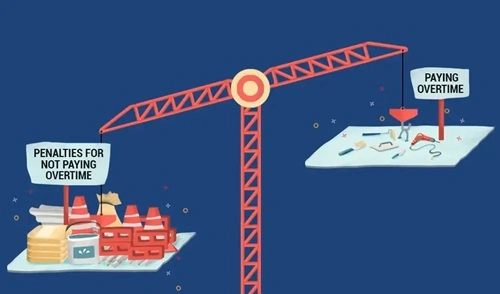Yes, it is illegal for employers to not pay overtime to eligible employees in the United States under federal and state laws. The Fair Labor Standards Act (FLSA), enforced by the U.S. Department of Labor (DOL), requires employers to pay non-exempt employees overtime at a rate of at least 1.5 times their regular hourly wage for hours worked over 40 in a workweek. Failure to comply with these requirements can lead to penalties, lawsuits, and back pay awards.
Federal Overtime Laws
1. Fair Labor Standards Act (FLSA)
- The FLSA governs overtime pay nationwide and mandates that non-exempt employees be paid 1.5 times their regular hourly wage for all hours worked beyond 40 in a single workweek.
- Employers must maintain accurate records of hours worked and wages paid.
- There are no federal laws requiring overtime pay for working on weekends, holidays, or nights unless those hours exceed 40 in a week.
2. Exempt vs. Non-Exempt Employees
- Non-Exempt Employees: Eligible for overtime pay. These include hourly workers and some salaried employees who meet specific criteria.
- Exempt Employees: Not eligible for overtime. These are typically salaried employees in executive, administrative, professional, or certain computer-related roles, earning a salary of at least $684 per week (as of 2024).
State Overtime Laws
Many states provide additional protections or expand overtime eligibility. Examples include:
1. California: Employees are entitled to overtime pay for hours worked over 8 in a day and double time for hours worked over 12 in a day or 8 on the seventh consecutive day of work.
2. New York: Adheres to the FLSA’s standards but enforces stricter penalties for violations and requires timely payment of overtime.
3. Colorado: Requires overtime pay for hours worked over 40 in a week, 12 in a day, or 12 consecutive hours.
Common Employer Violations
1. Misclassifying Employees
Employers may incorrectly classify employees as exempt to avoid paying overtime. For example, labeling an employee as “managerial” without meeting the exemption criteria is illegal.
2. Failing to Track Hours
Employers are required to track all hours worked accurately. Failure to do so often results in unpaid overtime claims.
3. Unlawful Salary Agreements
Employers cannot use flat salaries to avoid overtime pay. Non-exempt employees must still receive overtime, regardless of whether they are salaried or hourly.
4. Unauthorized Overtime
Even if an employer does not authorize overtime, they are still required to pay for any overtime worked if they knew or should have known the employee was working extra hours.
Consequences for Employers Who Violate Overtime Laws
1. Back Pay: Employers may be required to pay unpaid overtime wages to affected employees.
2. Liquidated Damages: Under the FLSA, employees may be entitled to an additional amount equal to their unpaid overtime as liquidated damages.
3. Fines and Penalties
- Employers may face civil penalties, with repeat offenders subject to higher fines.
- Criminal penalties, including imprisonment, can apply in cases of willful violations.
4. Class-Action Lawsuits: Employees may file collective or class-action lawsuits for widespread overtime violations, resulting in significant financial liabilities for employers.
How Employees Can Protect Their Rights
1. Keep Detailed Records
Employees should maintain their own records of hours worked, including overtime hours, to verify discrepancies.
2. File a Complaint
Workers can report unpaid overtime to the DOL or their state labor department. The DOL offers an anonymous complaint process.
3. Consult Legal Counsel
Employees can seek advice from employment attorneys or file private lawsuits for unpaid overtime.
Related FAQs
Q1. Who qualifies for overtime pay?
Ans: Non-exempt employees under the FLSA are eligible for overtime pay. Exempt employees, typically salaried workers meeting specific criteria, are not.
Q2. Can my employer refuse to pay me overtime if I work more than 40 hours?
Ans: No, employers cannot refuse to pay overtime if you are a non-exempt employee and worked over 40 hours in a workweek.
Q3. What can I do if my employer does not pay me overtime?
Ans: File a complaint with the Department of Labor or consult an employment attorney to pursue legal action.
Q4. Are independent contractors entitled to overtime?
Ans: No, independent contractors are not covered by the FLSA and are not entitled to overtime pay.
Q5. Is overtime pay required for working on holidays?
Ans: Federal law does not mandate overtime for holiday work unless it exceeds 40 hours in a week. Some employers voluntarily offer extra pay for holidays.

